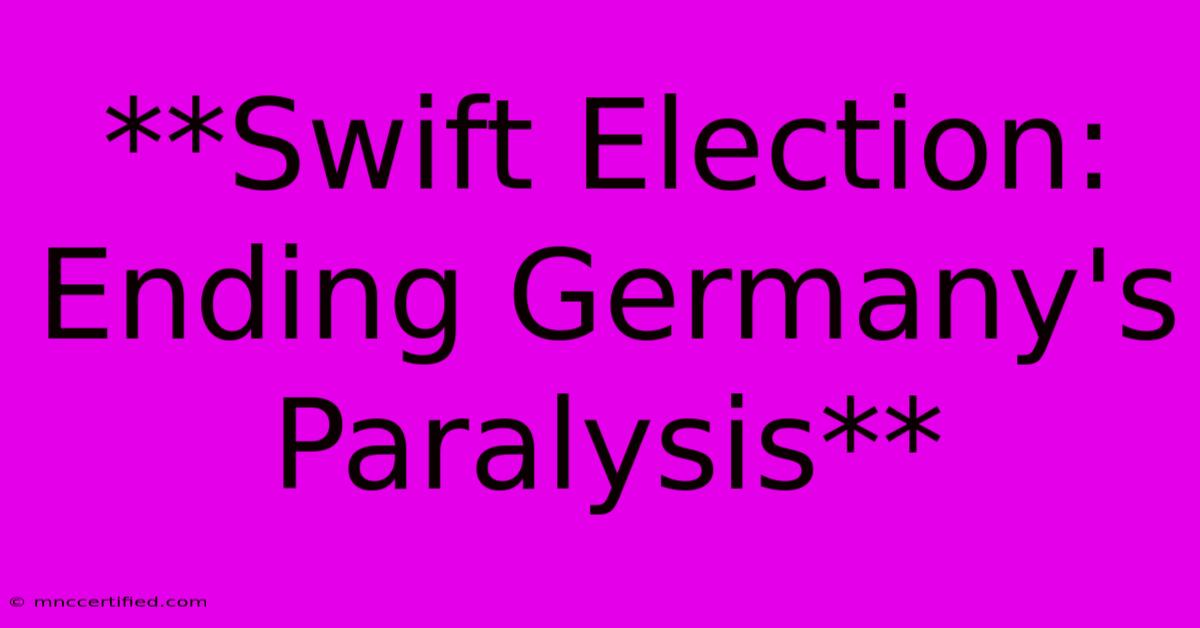**Swift Election: Ending Germany's Paralysis**

Table of Contents
Swift Election: Ending Germany's Paralysis
Germany, a nation known for its stability and steady hand in European politics, has found itself in an unusual predicament: political paralysis. Following the September 2021 federal election, coalition negotiations have dragged on for months, leaving the country without a functioning government. This prolonged impasse has raised concerns about Germany's ability to respond effectively to pressing challenges like the ongoing COVID-19 pandemic and climate change.
The current situation is a stark contrast to Germany's long-held reputation for efficient and decisive government. The country's political landscape is characterized by a strong tradition of consensus-building and compromise, often leading to stable coalitions with clear policy agendas. However, the 2021 election, with its fragmented results and the rise of new political forces, has disrupted this established pattern.
The Causes of Political Paralysis
The root of the current paralysis lies in the complex political landscape emerging from the election. The long-standing Grand Coalition between the Christian Democratic Union (CDU) and the Social Democratic Party (SPD) crumbled, paving the way for a more fragmented parliament. The rise of the Greens and the Free Democratic Party (FDP) as significant players in the election added to the complexity of forming a stable coalition.
Here are some key factors contributing to the prolonged negotiations:
- Ideological differences: The potential coalition partners hold diverging views on crucial issues like climate policy, fiscal responsibility, and social welfare.
- Power struggles: The relative strength of the various parties, along with their ambition for key cabinet positions, has hampered the negotiation process.
- Public pressure: The public is growing impatient with the drawn-out negotiations, demanding a swift resolution and a functional government to address pressing issues.
The Implications of Delay
The delay in forming a government has had several consequences for Germany:
- Stalled policy decisions: Important policy decisions on issues like climate change, economic recovery, and COVID-19 response are being postponed, potentially hindering progress.
- Diminished international influence: Germany's ability to act decisively on the international stage is hampered, impacting its role in global affairs.
- Uncertainty for businesses: The prolonged uncertainty about the government's future policy direction creates anxiety for businesses, potentially impacting investment and economic growth.
The Need for a Swift Solution
The current political paralysis in Germany poses a significant threat to the country's stability and its ability to address critical challenges. A swift resolution is crucial to ensure:
- Effective governance: A functioning government is necessary to implement policies and address the urgent needs of the nation.
- Economic stability: Clear policy direction and a stable government are essential for economic confidence and growth.
- International leadership: A united and decisive Germany is needed to play a strong role in global affairs.
Moving Forward
The current situation demands a pragmatic approach from all political actors. Compromise and flexibility are essential to break the deadlock and form a stable coalition. It's crucial to prioritize the needs of the nation over individual political ambitions.
The people of Germany deserve a government that can effectively address the challenges facing the country. It's time to put aside political posturing and prioritize the common good by swiftly forming a stable and effective government. Only then can Germany truly move forward and address the challenges ahead.

Thank you for visiting our website wich cover about **Swift Election: Ending Germany's Paralysis** . We hope the information provided has been useful to you. Feel free to contact us if you have any questions or need further assistance. See you next time and dont miss to bookmark.
Featured Posts
-
Auto Insurance Declaration Page Template
Nov 08, 2024
-
German Government Collapse Impact And Aftermath
Nov 08, 2024
-
Houshmandzadeh Sees Bright Future For Bengals
Nov 08, 2024
-
Jimmy Kimmels Trump Win Monologue
Nov 08, 2024
-
Bo E Rate Cut To 4 75 Impact On You
Nov 08, 2024